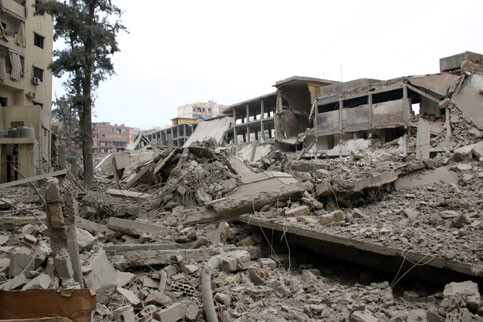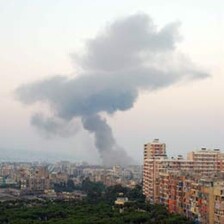Beirut 21 July 2006

Destruction in Hay Madi, a southern suburb of Beirut, after an Israeli airstrike. Photo taken 20 July 2006 (Hugh Macleod/IRIN)
It will be an emotional scene tomorrow saying “yalla bye” to our friends who are evacuating from this nasty little war. Most swear they will return. The campus of the American University of Beirut (AUB) will seem a different place then, though it is hard to imagine what it will be like. A handful of non-Lebanese faculty and staff have decided to remain. Betsy and I are among them. We have been together since 1972, and we made the decision together to stay together here. What could we be thinking?
We have been liberated to make this decision by the support of our huge families (we have 34 nieces and nephews), our wonderful friends in several locations (you know who you are), and our two sons (who can fly on their own, inshallah).
We do feel anger at what is happening to Lebanon. We don’t like being driven out, but that is not the reason we are staying.
We are staying because we have commitments. I was hired in 2004 as the first Director of the Prince Alwaleed Bin Talal Center for American Studies and Research. You may recall that Prince Awaleed offered Rudy Giuliani $10 million after 9/11, but the New York Mayor returned it when the Prince suggested that the United States might consider a more balanced policy toward the Israeli-Palestinian conflict.
Then, shortly after the US invasion of Iraq, Prince Alwaleed provided large endowments to American University of Beirut and American University in Cairo to create American studies centers with missions to increase understanding between the people of the US and those of the Arab World. Lebanon - surely the most free country in the Arab World - and AUB, where the most open debate is possible, along with an independent endowment, provided the possibility for the center to examine the United States and its relations to the Middle East in a wide open way.
We were able to host scholars very critical of US foreign policies, like Noam Chomsky; but we were also able to offer a course called The Holocaust in American Literature and Culture. The center, AUB, Beirut, and Lebanon constitute a space of unusual potential, a potential that is at odds with what many think is possible in this region. I know it will be a challenge to keep this space alive and open in the coming months, but how can I abandon it?
We also feel committed to our Lebanese friends and to the entire nation that has offered us inspiring hospitality. There is no evacuation plan for them. As Americans and other foreigners bug out, the Lebanese are staring at a catastrophe soon to be ignored by the fickle whims of news as entertainment. Daily Star journalist Rami Khouri is trying to get back to Beirut because, as he puts it, standing with the people of Lebanon in their moment of pain is the highest form of solidarity one can think of. We want to be here as long as possible just to say: we are all still standing in Beirut.
Related Links
Patrick McGreevy heads up the American Studies Program at the American University of Beirut





